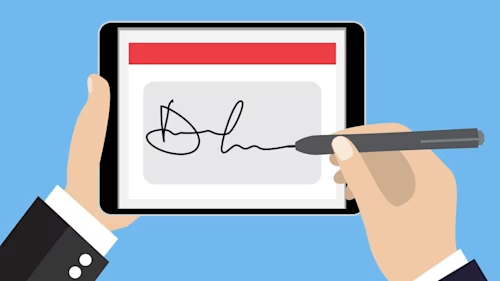
Gewährleistung von Datensicherheit und Vertrauen: Warum die C5-Zertifizierung für Ihr Unternehmen wichtig ist
Bei Docusign verstehen wir, dass Datensicherheit in der heutigen digitalen Landschaft von höchster Bedeutung ist. Ob Sie Verträge, Vereinbarungen oder sensible Kundeninformationen verwalten, Sie benötigen die Gewissheit, dass Ihre Daten geschützt sind. Deshalb möchten wir die Bedeutung der C5-Zertifizierung für die elektronische Signatur hervorheben und wie sie unseren geschätzten Kunden wie Ihnen zugute kommt.

Was genau ist die C5-Zertifizierung?
C5 steht für Cloud Computing Compliance Controls Catalogue. Es handelt sich um eine Reihe strenger Sicherheitsrichtlinien, die vom Bundesamt für Sicherheit in der Informationstechnik (BSI) entwickelt wurden. Dieser entscheidende Rahmen hilft Cloud-Service-Providern (CSPs) und ihren Kunden, die Cloud-Sicherheit auf der Grundlage internationaler Standards und Best Practices für Cybersicherheit zu bewerten und zu verbessern. Im Bereich der Cloud-Security-Compliance ist C5 ein wichtiges Unterscheidungsmerkmal. Docusign’s elektronische Signatur erfüllt alle Anforderungen dieser Zertifizierung.
Warum ist die C5-Zertifizierung für Ihr Unternehmen wichtig?
Wenn Sie sich für einen C5-zertifizierten Anbieter wie Docusign entscheiden, erhalten Sie mehrere entscheidende Vorteile, die Ihren Datenschutz und Ihre Sicherheit gewährleisten:
Verbesserter Datenschutz: Die C5-Zertifizierung bedeutet, dass wir robuste Maßnahmen zum Schutz der Vertraulichkeit, Integrität und Verfügbarkeit Ihrer Daten implementiert haben. Dazu gehören Datenverschlüsselung, strenge Zugriffskontrollen und zuverlässige Backup- und Wiederherstellungsverfahren. Ihre sensiblen Daten werden mit größter Sorgfalt behandelt.
Starkes Sicherheitsmanagement: Wir unterhalten ein umfassendes Sicherheitsmanagementsystem, um Risiken für unsere Cloud-Dienste zu identifizieren, zu bewerten und zu mindern. Dies gewährleistet eine proaktive und sich kontinuierlich verbessernde Sicherheitslage. Wir legen Wert auf Risikomanagement und Sicherheitsaudits.
Effektives Incident Management: Im unwahrscheinlichen Fall eines Sicherheitsvorfalls haben wir Verfahren eingerichtet, um diesen schnell zu erkennen, darauf zu reagieren und ihn zu melden, wodurch mögliche Auswirkungen auf Ihre Betriebsabläufe minimiert werden. Unser Incident-Response-Plan ist robust und effizient.
Business Continuity: Wir legen Wert auf die Verfügbarkeit unserer Dienste und haben Pläne, um die Geschäftskontinuität im Falle von Störungen oder Katastrophen sicherzustellen. Wir verstehen die Bedeutung von Uptime und Disaster Recovery.
Gesetzliche Compliance: Wir halten uns an alle geltenden Gesetze und Vorschriften in Bezug auf Cloud-Sicherheit und Datenschutz und unterziehen uns regelmäßigen Bewertungen, um die Compliance aufrechtzuerhalten. Dies gewährleistet die Einhaltung gesetzlicher Vorschriften und vermeidet potenzielle rechtliche Probleme.
Was bedeutet das für die Sicherheit Ihres Unternehmens?
Die Wahl eines C5-zertifizierten Anbieters wie Docusign gibt Ihnen Sicherheit. Sie können darauf vertrauen, dass Ihre sensiblen Daten in sicheren Händen sind. Diese Zertifizierung demonstriert unser Engagement für Datenschutz und Sicherheit, was entscheidend für den Aufbau von Vertrauen bei Ihren eigenen Kunden und Partnern sein kann. Durch die Priorisierung von Best Practices für die Datensicherheit helfen wir Ihnen, Ihr Unternehmen zu schützen.
Die C5-Typ-II-Konformität bestätigt, dass das Sicherheitsprogramm und die Kontrollen des eSignature-Produkts von Docusign die Anforderungen des Bundesamts für Sicherheit in der Informationstechnik (BSI) erfüllen. Dies kann in bestimmten Branchen, wie z.B. Healthcare einen entscheidenden Unterschied ausmachen.
Docusign und unser Engagement für Ihre Datensicherheit
Bei Docusign gehen wir über die Erfüllung der Anforderungen der C5-Zertifizierung hinaus. Wir sind ständig bestrebt, unsere Cloud-Sicherheit zu verbessern, indem wir:
Gründliche Risikobewertungen unserer Daten und Anwendungen durchführen.
Multi-Faktor-Authentifizierung (MFA) und starke Passwortrichtlinien implementieren.
Unsere Cloud-Aktivitäten und Protokolle regelmäßig mithilfe fortschrittlicher Sicherheitsüberwachung Tools auf verdächtiges Verhalten überwachen.
Unsere Mitarbeiter in den neuesten Best Practices für Sicherheit und Cybersecurity-Bewusstsein schulen.
Fazit: Sichern Sie Ihre Zukunft mit der C5-Zertifizierung
Die C5-Zertifizierung ist ein kritischer Maßstab für die Cloud-Sicherheit. Indem Sie sich für Docusign’s elektronische Signatur, ein C5-zertifiziertes Produkt, entscheiden, unternehmen Sie einen proaktiven Schritt zum Schutz Ihrer wertvollen Daten und zur Gewährleistung der Sicherheit Ihrer Geschäftsabläufe. Wir sind bestrebt, die höchsten Sicherheitsstandards aufrechtzuerhalten und Ihnen eine vertrauenswürdige und zuverlässige Plattform für Ihre digitalen Vereinbarungen bereitzustellen.

Ähnliche Beiträge
Docusign IAM ist die Vertragsplattform, die Ihr Unternehmen braucht


